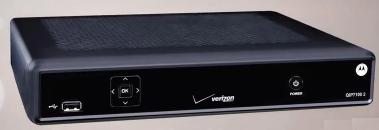Verizon Nears Launch Of FiOS Media Server
The smarter way to stay on top of the multichannel video marketplace. Sign up below.
You are now subscribed
Your newsletter sign-up was successful

Verizon Communications in the next few months expects to roll out a gateway device, dubbed the Verizon Media Server, that will let third-party IP devices discover, access and control FiOS TV services -- but the company wants the FCC to postpone a rule mandating compliance with an “open” home-networking standard until mid-2014.
In December 2011, the telco announced its development of an IP-enabled media gateway for FiOS TV, built by Motorola Mobility, designed to distribute video wirelessly to tablets, game consoles and other devices in the home, as well as cut energy consumption. Along with the media gateway, the telco said it would distribute smaller IPTV set-top boxes, which will eventually be small enough to affix to the back of a TV.
Verizon hasn’t announced specific launch dates or pricing for the gateway. It previously was targeting “late 2012” to launch the device.
The forthcoming Verizon Media Server “will fully meet the Commission’s output and home networking requirements and create new choices for consumers in... how and on which devices they access content,” the company said in a filing last Friday with the Federal Communications Commission.
Verizon was commenting on TiVo’s request for waiver of commission rules that currently will require cable operators’ HD set-tops to "comply with an open industry standard" for home networking by Dec. 1, 2012.
The telco argued that the FCC’s Media Bureau should extend the deadline “for all parties in light of the current status of standards development” by at least 18 months.
The Verizon Media Server will use standards such as those from the Digital Living Network Alliance (DLNA) and the Multimedia over Coax Alliance (MoCA) “to enable simultaneous streaming of FiOS content to multiple devices over a subscriber’s home network, ultimately without the need for any additional Verizon equipment at all,” the telco said.
The smarter way to stay on top of the multichannel video marketplace. Sign up below.
However, those standards “are still a work in progress,” Verizon said, noting that the next DLNA standard is unlikely to be approved until 2013, making the Dec. 1, 2012, deadline unworkable. “Moreover, even after standards are established, manufacturers will have to implement those standards in their devices, and subsequently deploy those devices into the marketplace -- a process that can often take a year or more,” Verizon said.
According to the FCC, the “open industry standard” rule is designed to make sure consumers can connect consumer-electronics devices they own to set-top boxes leased from MSOs for whole-home viewing and DVR recording.
TiVo was seeking clarification that "an open industry standard" in the rule would refer to a single, industry-wide standard, such as DLNA. “If each cable operator deploys set-top devices based on its own understanding of ‘an’ open industry standard, the result may be an outcome that, in terms of home network interoperability, is neither standard nor open,” the DVR company said in its waiver petition.
While Verizon agreed that TiVo’s position “generally underscores the need for broader relief across providers and equipment,” it argued that “there is no need for a single standard to ensure TiVo’s success in this market -- any obstacles to implementing multiple protocols in third-party hardware generally are manageable.”
For example, Verizon said, there is “no technical or practical obstacle to a third-party device using both tru2way and DLNA over an Ethernet connection, just as a desktop computer can use both HTTP and FTP over its Ethernet connection.”
The AllVid Alliance, whose members include Best Buy, Google, Sony Electronics, Intel and TiVo, has urged the FCC to establish rules forcing all pay-TV service providers to deliver video to third-party devices via a standard IP interface.
The AllVid lobbying group said in a Sept. 21 filing that it supported TiVo’s request for a 12-month waiver of the “open industry standard requirement,” but also called for the FCC to institute a “more comprehensive” rulemaking that would let retail devices present their own on-screen guide and content alongside pay-TV programming.
However, even in the absence of standards like DLNA, Verizon is opening up FiOS TV to other devices, the telco pointed out.
For example, the company provides an app for Microsoft's Xbox 360 game console that lets FiOS TV customers access 26 live TV channels. Verizon also lets subscribers access TV Everywhere services online from HBO, Starz, ESPN, TNT, Comedy Central and other networks on their computers or laptops.
Separately, the Consumer Electronics Association and Mediacom Communications both filed comments last week with the FCC supporting TiVo’s waiver request.
The CEA said the commission "needs to address the December 1, 2012, compliance date imminently and urgently to avoid proprietary implementations that would undermine the purpose of the rule and chill the innovation and consumer utility that the rule was designed to enable.”
